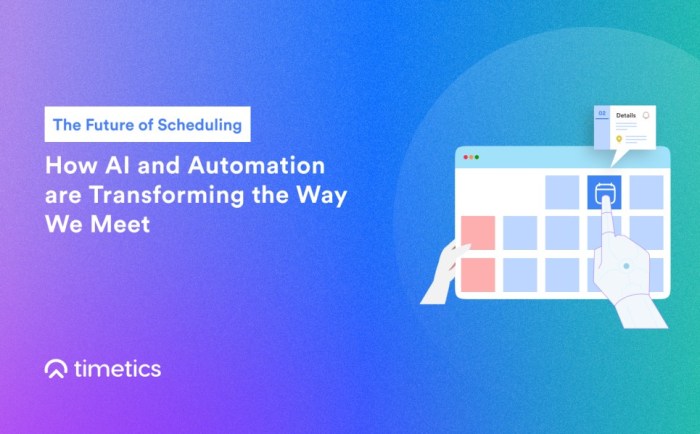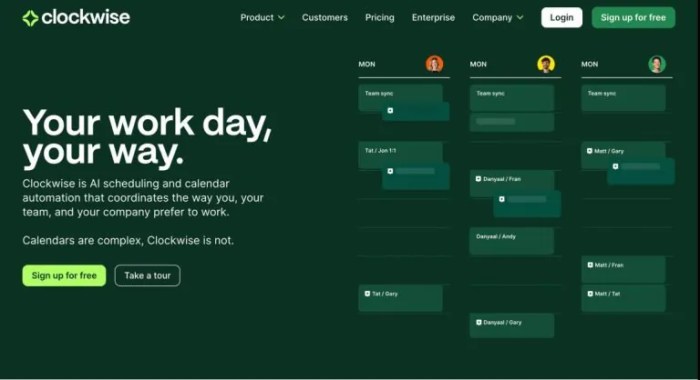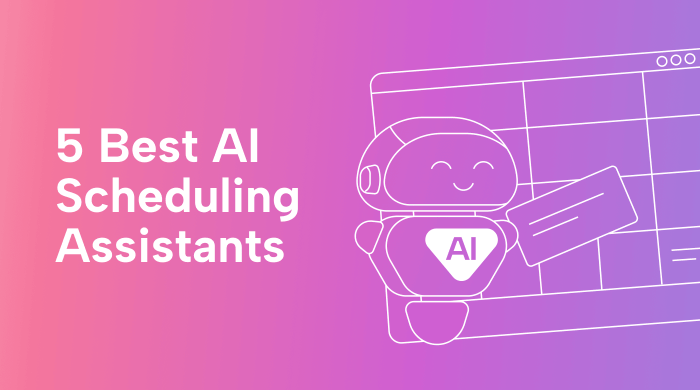Intelligent scheduling with AI is transforming how organizations manage their time and resources. By leveraging artificial intelligence, businesses can automate scheduling processes that were once manual and time-consuming, leading to increased efficiency and productivity. The integration of AI in scheduling not only streamlines operations but also enhances decision-making by analyzing vast amounts of data, ensuring that tasks are prioritized and assigned effectively.
This innovative approach allows companies across various industries to optimize their workflows, ultimately improving service delivery and operational effectiveness. With intelligent scheduling, organizations can adapt to changing demands in real time, making it a crucial component in the modern business landscape.
Introduction to Intelligent Scheduling with AI
Intelligent scheduling refers to the process of automating and optimizing scheduling tasks using artificial intelligence (AI) technologies. This advanced approach leverages machine learning, predictive analytics, and data processing to improve the efficiency and accuracy of scheduling across various sectors. Integrating AI into scheduling processes has become increasingly significant as businesses seek to enhance productivity, streamline operations, and reduce human error.
The potential benefits of using AI for scheduling tasks are vast. Organizations can achieve improved accuracy in scheduling, leading to better resource allocation and utilization. By processing large amounts of data in real-time, AI can identify patterns and make decisions that humans may overlook, thus facilitating timely responses to changing conditions. This results in enhanced operational efficiency and reduced operational costs.
Key Technologies Behind Intelligent Scheduling
The primary technologies that enable intelligent scheduling systems include:
- Machine Learning Algorithms: These algorithms learn from historical data and improve their predictions over time, enhancing scheduling accuracy.
- Natural Language Processing (NLP): NLP allows systems to interpret and process human language, facilitating more intuitive scheduling interfaces.
- Big Data Analytics: The ability to analyze vast datasets helps organizations make informed scheduling decisions based on real-time insights.
Machine learning algorithms significantly contribute to scheduling efficiency by identifying optimal time slots, resource availability, and task prioritization. Software tools such as Microsoft Project, Asana, and Trello incorporate AI functionalities to automate scheduling tasks and improve coordination among team members.
Applications of Intelligent Scheduling
Various industries benefit from intelligent scheduling solutions, including:
- Healthcare: AI-driven scheduling tools help hospitals manage patient appointments effectively, optimizing staff utilization.
- Manufacturing: AI enhances production scheduling, ensuring that resources are allocated efficiently to meet demand.
- Transportation: Intelligent systems optimize vehicle routing and scheduling, reducing fuel costs and improving service delivery.
Specific use cases where AI scheduling has made a significant impact include:
- Airlines utilizing AI to optimize flight schedules and crew assignments.
- Retail companies employing AI to manage inventory restocking schedules based on customer demand predictions.
Companies like Google and Amazon have successfully implemented intelligent scheduling, resulting in increased operational efficiency and enhanced customer satisfaction.
Challenges in Implementing AI-Based Scheduling

Organizations face several common obstacles when adopting intelligent scheduling systems, such as:
- Data Quality Issues: Inaccurate or incomplete data can lead to suboptimal scheduling outcomes.
- Integration Challenges: Difficulty in integrating AI systems with existing infrastructure can hinder implementation.
- Change Resistance: Employees may resist changing traditional scheduling methods to AI-driven processes.
Data privacy and security concerns are significant, as organizations must ensure that sensitive information is protected. Strategies to mitigate these challenges include investing in robust data management practices, providing training for employees, and gradually introducing AI systems to ease the transition.
Future Trends in AI Scheduling, Intelligent scheduling with AI
Emerging trends in AI that could shape the future of scheduling include:
- Increased Use of Predictive Analytics: Leveraging historical data to forecast scheduling needs more accurately.
- Real-time Adjustments: AI systems will increasingly adapt schedules dynamically based on real-time data inputs.
- Enhanced User Interfaces: More intuitive interfaces that allow users to interact with scheduling tools more effectively.
The role of big data in enhancing scheduling algorithms cannot be overstated, as it enables the processing of diverse data sources for better decision-making.
| Current Practices | Future Predictions |
|---|---|
| Static scheduling based on historical data. | Dynamic scheduling that adapts in real-time. |
| Manual adjustments to schedules. | Fully automated scheduling adjustments using AI. |
| Limited integration with existing tools. | Seamless integration across multiple platforms. |
Best Practices for Effective Intelligent Scheduling

Organizations can optimize their scheduling with AI by following these best practices:
- Regularly Update Data: Ensuring data used for scheduling is current to improve accuracy.
- Invest in Training: Providing training for staff to effectively use AI scheduling tools.
- Monitor Performance: Continuously evaluate scheduling effectiveness and make necessary adjustments.
Continuous learning and adaptation are crucial for scheduling systems to keep pace with changing demands and technological advancements. A checklist for evaluating AI scheduling tools and solutions includes:
- Data integration capabilities.
- User-friendliness of the interface.
- Quality of customer support.
- Scalability for future growth.
Case Studies of Successful AI Scheduling Implementation
One notable case study is a healthcare organization that implemented AI scheduling to manage patient appointments more effectively. By integrating AI into their scheduling process, the organization reduced patient wait times by 30%, leading to enhanced patient satisfaction.
Comparing two different approaches taken by organizations for AI scheduling reveals that while one company focused on developing an in-house solution, another opted for a third-party AI tool. The former faced integration challenges, while the latter achieved quicker results and scalability.
A summary of results achieved through intelligent scheduling in various sectors highlights significant improvements in operational efficiency, reduced costs, and enhanced customer experiences. Companies continue to recognize the value of integrating AI into their scheduling processes, paving the way for future innovations.
Ending Remarks: Intelligent Scheduling With AI

In summary, the advent of intelligent scheduling with AI is reshaping organizational dynamics and paving the way for more effective time management solutions. As businesses continue to embrace these advanced systems, they will not only overcome existing challenges but also unlock new opportunities for growth. The future of scheduling is bright, promising enhanced productivity, improved resource allocation, and the ability to meet the ever-evolving demands of the market.